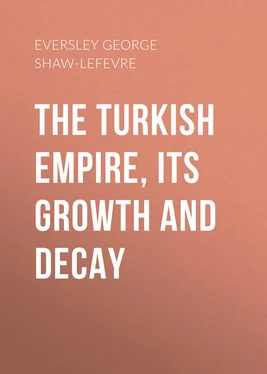George Eversley - The Turkish Empire, its Growth and Decay
Здесь есть возможность читать онлайн «George Eversley - The Turkish Empire, its Growth and Decay» — ознакомительный отрывок электронной книги совершенно бесплатно, а после прочтения отрывка купить полную версию. В некоторых случаях можно слушать аудио, скачать через торрент в формате fb2 и присутствует краткое содержание. Жанр: foreign_antique, foreign_prose, на английском языке. Описание произведения, (предисловие) а так же отзывы посетителей доступны на портале библиотеки ЛибКат.
- Название:The Turkish Empire, its Growth and Decay
- Автор:
- Жанр:
- Год:неизвестен
- ISBN:нет данных
- Рейтинг книги:3 / 5. Голосов: 1
-
Избранное:Добавить в избранное
- Отзывы:
-
Ваша оценка:
- 60
- 1
- 2
- 3
- 4
- 5
The Turkish Empire, its Growth and Decay: краткое содержание, описание и аннотация
Предлагаем к чтению аннотацию, описание, краткое содержание или предисловие (зависит от того, что написал сам автор книги «The Turkish Empire, its Growth and Decay»). Если вы не нашли необходимую информацию о книге — напишите в комментариях, мы постараемся отыскать её.
The Turkish Empire, its Growth and Decay — читать онлайн ознакомительный отрывок
Ниже представлен текст книги, разбитый по страницам. Система сохранения места последней прочитанной страницы, позволяет с удобством читать онлайн бесплатно книгу «The Turkish Empire, its Growth and Decay», без необходимости каждый раз заново искать на чём Вы остановились. Поставьте закладку, и сможете в любой момент перейти на страницу, на которой закончили чтение.
Интервал:
Закладка:
To Othman, therefore, is due the credit of this inception of a new State and a new and distinct people. He did not, however, assume the title of Sultan. He was simply an Emir, like so many other rulers of petty States in Asia Minor. He was not a great general. He had no opportunity of conducting a great campaign. He was a brave soldier and a sagacious leader, who inspired confidence and trust in his followers and subjects. He pursued with great persistency the policy of enlarging his domain. He was also a wise and capable administrator, and was assisted in this by his father-in-law, Idebali, who acted as his Vizier. He meted out equal justice to all his subjects, irrespective of race and religion. He was simple and unostentatious in his habits. There is no record of his having more than one wife or more than two sons. He did not amass wealth. He divided the loot of war equally among his soldiers, setting apart a portion for the poor and orphans.
Othman had a vein of cruelty in his character, as had so many of his descendants, the Ottoman Sultans. When, on one occasion, he propounded to his war council a scheme of further aggression on his neighbours, his uncle, Dundar, a nonagenarian, who had been companion in arms to Ertoghrul, ventured to raise objection to the policy of further extension. Othman, instead of arguing the question with him, took up his cross-bow and shot his uncle dead on the spot, and in this way closured the discussion and put down, at the outset, opposition in the council.
Von Hammer, in relating this story, says: —
This murder of the uncle marks with terror the commencement of the Ottoman dominion, as the brother’s murder did that of Rome, only the former rests on better historical evidence. Idris (the Turkish historian), who, at the beginning of his work, declares that, passing over in silence all that is reprehensible, he will only hand down to posterity the glorious deeds of the royal race of Othman, relates, among the latter, the murder of Dundar. If then such a murderous slaughter of a relative be reckoned by the panegyrists of the Osmanlis among their praiseworthy acts, what are we to think of those which cannot be praised and of which their history therefore is silent? 1 1 Von Hammer, i. p. 28 (French translation).
We must judge of Othman, however, not by the standard of the present time, but by that of his contemporaries. By that standard he was reckoned a humane and merciful sovereign. This view is expressed in the prayer which has been used in the religious ceremony, on the accession of every one of his successors to the throne, when he is girt with the double-edged sword of the founder of the Empire, “May he be as good as Othman.”
In his old age, when Othman was incapable of taking the field himself, his son, Orchan, took his place as the leader of the army, and just before the death of Othman, Brusa surrendered to him. It was then, as now, one of the most important cities in Asia Minor.
When Othman was on his deathbed, after a reign of thirty-eight years, his son Orchan, in terms of affection and lamentation, addressed him: “Oh, Othman! Thou fountain of Emperors, Lord of the World, Thou conqueror and subduer of Nations.” The dying king replied: —
Lament not, oh my sons: delight! for this my last conflict is the lot of all human kind, common to young and old, who equally breathe the air of this malignant world. Whilst I now pass to immortality, live thou glorious, prosperous, and happy. Since I have thee for successor, I have no cause to grieve at my departure. I will give thee my last instructions, to which be attentive. Bury the cares of life in oblivion. I conjure thee, crowned with felicity, lean not to tyranny, nor so much as look towards cruelty. On the contrary, cultivate justice and thereby embellish the earth. Rejoice my departed soul with a beautiful series of victories, and when thou art become conqueror of the world, propagate religion by thy arms. Promote the learned to honour, so the divine law shall be established, and in what place soever thou hearest a learned man, let honour, magnificence, and clemency attend him. Glory not in thy armies, nor pride thyself in thy riches. Keep near thy person the learned in the law, and, as justice is the support of kingdoms, turn from everything repugnant thereto. The Divine law is our sole arm, and our progress is only in the paths of the Lord. Embark not in vain undertakings or fruitless contentions. For it is not our ambition to enjoy the empire of the world, but the propagation of the faith was my peculiar desire, which therefore it becomes thee to accomplish. Study to be impartially gracious to all, and take care to discharge the public duties of thy office, for a king not distinguished by goodness belies the name of a king. Let the protection of thy subjects be thy constant study, so shalt thou find favour and protection from God. 2 2 Cantemir, p. 20.
It is probable that much of this was the invention of some historian, writing many years later. It may be taken, however, as a summary, based on tradition, of the principles which had actuated the dying chief during his long reign.
Othman died shortly after receiving the welcome news of the surrender of Brusa, and by his last wish was buried there. He was the progenitor of a royal race who, for nine more generations, continued the career of conquest which he inaugurated, till the Empire, in the middle of the sixteenth century, two hundred and seventy-eight years from the accession of Othman, under Solyman the Magnificent, the greatest of his race, reached its zenith. It was only after ten generations of great Sultans that the race seemed to be exhausted, and thenceforth, with rare exceptions, produced none but degenerates down to the present time.
II
ORCHAN
1326-59
Othman, on his deathbed, designated as his successor the younger of his two sons, Orchan, aged forty-two, who had been brought up as a soldier under his father’s eye, and had shown capacity in many campaigns, and especially in that resulting in the surrender of Brusa. Alaeddin, the elder brother, was not a soldier. He had led a studious life, devoted to religion and law, both founded on the Koran, under the guidance of Idebali.
The Turkish historians agree in stating that Orchan was most unwilling to act on his father’s wishes and take precedence over his elder brother, and that he proposed to divide the heritage of state between them, but that Alaeddin declined the offer. Orchan is then reported to have said: “Since, my brother, thou wilt not take the flocks and herds which I offer thee, be the shepherd of my people. Be my Vizier.” Alaeddin agreed to this, and devoted himself to the administration of the growing State and to the organization of the army, under the rule of his brother. 3 3 Mr. Gibbons refuses credence to this interesting story on the ground mainly of its inherent improbability. His argument does not convince me. The succession of the younger brother to the Emirate without a fight for it, on the part of the elder one, was an event so remarkable, and so contrary to all experience in Ottoman history, as to make the explanation given a reasonable one. The probabilities seem to me to be all in its favour. Alaeddin died in 1337. It is admitted that for seven years he acted as the first Grand Vizier of the Ottoman State. It may well be, therefore, that he commenced, if he did not complete, the important organization of the army with which he has been credited by Turkish historians.
Orchan followed closely the example of his father. He pursued the same method of slow, but sure and persistent, aggrandizement of his State. It will be seen that he succeeded in adding to it a territory nearly three times greater than that which he inherited. Two-thirds of this were in the north-west corner of Asia Minor, along the shore of the Marmora and the Dardanelles, and the remaining third in Europe, where he was the first to make a lodgment for the Ottomans. He made Brusa his capital, and there, after a time, he assumed the title of Sultan. He coined money with the inscription, “May God cause to endure the Empire of Orchan, son of Othman.” The phrase must be taken rather as a measure of his ambition than as a description of his existing State, for it was then inferior in size to several of the Turkish Emirates in Asia Minor and to most of the Balkan States. Orchan led a most active and simple life. He was always on the move. When not in the field with his troops, he spent his time in visiting his many petty strongholds, seldom remaining more than a month in any one of them.
Читать дальшеИнтервал:
Закладка:
Похожие книги на «The Turkish Empire, its Growth and Decay»
Представляем Вашему вниманию похожие книги на «The Turkish Empire, its Growth and Decay» списком для выбора. Мы отобрали схожую по названию и смыслу литературу в надежде предоставить читателям больше вариантов отыскать новые, интересные, ещё непрочитанные произведения.
Обсуждение, отзывы о книге «The Turkish Empire, its Growth and Decay» и просто собственные мнения читателей. Оставьте ваши комментарии, напишите, что Вы думаете о произведении, его смысле или главных героях. Укажите что конкретно понравилось, а что нет, и почему Вы так считаете.












